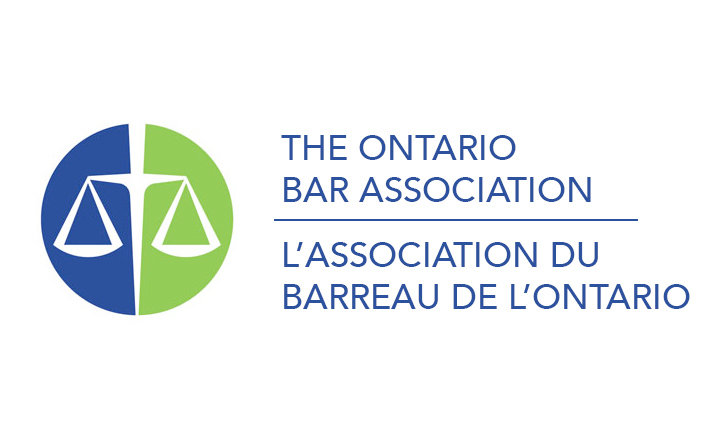
On June 11, 2025, Aubrey Sherman moderated and presented at Mediation Matters celebrates Pride Month 2025 with the Ontario Association for Family Mediation ("OAFM"). Aubrey joined a panel of distinguished professionals, including Kelly Jordan, Joanna Radbord, and Neeraj Goel for presentations and a panel discussion of the unique needs and challenges for LGBTQ2S+ families in mediation. The panelists joined OAFM members and guests to share stories of strength and resilience and discussed strategies for setting families up for success in the mediation process.
Moderator and Panelist: Aubrey Sherman, OAFM Board Member
Panelists:
✨ Kelly Jordan – Family Law Lawyer and Family Mediator
✨ Joanna Radbord – Family Law Lawyer and Author of LGBTQ2+ Law: Practice Issues and Analysis
✨ Neeraj Goel – Family Law Lawyer and Family Mediator

Sherman Law LLP is pleased to share that it has received three awards with Community Votes Kitchener-Waterloo 2025 in recognition for professional services categories:
PLATINUM - Mediation Services
PLATINUM - Estate Lawyers
SILVER - Kitchener-Waterloo Lawyers
Thank you to the Kitchener-Waterloo Community for your loyalty and continued support.

Sherman Law LLP is pleased to share that Aubrey J. Sherman, Managing Partner, will join Osgoode Hall Professional Development as a Faculty Facilitator in the Skills Workshops for The Osgoode Certificate in Family Law Skills and Practice, commencing April 2025.
The Osgoode Certificate in Family Law Skills and Practice was designed and is delivered by leading family law judges, lawyers and experts. Focusing on the practical, participants will work through the key stages of a family law file using a combination of in-depth case studies, simulated clients, and skills workshops. Participants will benefit from individualized feedback and practice learned concepts in a supportive learning environment. In an intimate online environment, participants will have opportunities to ask questions, engage with faculty and forge valuable connections with other family law professionals.

Sherman Law LLP is pleased to share that our partner, Aubrey Sherman has been asked to serve on the provincial Board of Directors for the Ontario Association for Family Mediation (OAFM). Aubrey has indicated that he looks forward to the opportunity to collaborate with a talented group of family mediators from across Ontario in this new governance role.
Ontario Association for Family Mediation (OAFM) enforces the Standards and Code of Ethics for Accredited Family, Child Protection and Intergenerational Mediators. OAFM maintains a roster of accredited members and ensures that through the use of an Accredited Mediator, the public can confidently rely on the mediation services they receive. OAFM creates standards for and approves all training and supervised practical experience that provides a pathway to accreditation.

I am going to focus on three types of conflict in family law, which can include: Parenting Conflict, Relationship Conflict, and Value Conflict. In yesterday's blog, we talked about Relationship Conflict.
Today, we will focus on Value Conflict:
Value conflict can arise from fundamental differences in identities and values. These differences can include differences in ethics, norms, politics, religion, what we perceive as right and wrong, how we see ourselves and our role in society, and various other deeply held values or cares.
Interpersonal disputes about values often heighten responses that are defensive and cause reactions of distrust and alienation. A party may feel so strongly about their values that they reject reasonable discussion of interests or compromise that would satisfy the other. Values lead our decision-making, often if we don't realize the significance that they play in our daily lives.
Values-based disputes can be difficult to resolve. Often, the goal becomes to move towards mutual understanding and respect through dialogue. The goal here is to aim for a better understanding in which the couple can reach a better understanding and acceptance of another's point of view. This type of understanding does not always require empathy or emotional connection, but rather a "values-neutral" ability to accurately describe what someone else believes about the situation.
Sometimes, you may be able to reframe a values-based dispute by reviewing and appealing to other values that the couple shares. The focus here can be on universal beliefs or joint values, rather than focusing on differences in beliefs or cares that may have caused the dispute.
Couples who are experiencing conflict can often benefit through intervention through a Family Professional or Family Mediator. These professionals can focus on identifying the deeper interests underlying the couple's conflict. Often, this is done through active listening, which involves asking questions, clarifying what you hear to confirm understanding, and deepening to ask deeper questions aimed at probing for a deeper understanding.
If you are dealing with a family law, separation, or parenting matter, we invite you to contact an experienced lawyer at our firm for more information about how we may be of assistance.
Aubrey Sherman is the managing partner at Sherman Law LLP in Kitchener, Ontario. His practice focuses on family law, estate planning, and estate administration. The team at Sherman Law LLP in Waterloo Region has over 40 years of experience providing clients with creative and innovative solutions. If you wish to discuss your family law or estate planning matter in further detail, please contact our office to arrange for a consultation. We can be reached by phone at 519-884-0034 or by email.

I am going to focus on three types of conflict in family law, which can include: Parenting Conflict, Relationship Conflict, and Value Conflict. In yesterday' s blog, we talked about Parenting Conflict.
Today, we will focus on Relationship Conflict:
Relationship conflict arises from differences in personality, style, preferences, interests, and perhaps even conflict styles. Often people in personal and intimate relationships will develop long-simmering tensions, whether over parenting, personality differences, family relationships, or a variety of other issues.
Couples who are experiencing conflict can often benefit through intervention through a Family Professional or Family Mediator. These professionals can focus on identifying the deeper interests underlying the couple's conflict. Often, this is done through active listening, which involves asking questions, clarifying what you hear to confirm understanding, and deepening to ask deeper questions aimed at probing for a deeper understanding.
When faced with this conflict, try to engage the couple in collaborative problem-solving in which they are able to brainstorm possible solutions. If you feel comfortable, try to bring up the sources of tension and focus on listening to other person's point of view. Try to resist the urge to argue or defend positions. When a spouse works to demonstrate empathy or interest, the other is likely to reciprocate. When couples develop solutions together, rather than having an outcome imposed on them, they are more likely to get along better in the future.
If you are dealing with a family law, separation, or parenting matter, we invite you to contact an experienced lawyer at our firm for more information about how we may be of assistance.
Aubrey Sherman is the managing partner at Sherman Law LLP in Kitchener, Ontario. His practice focuses on family law, estate planning, and estate administration. The team at Sherman Law LLP in Waterloo Region has over 40 years of experience providing clients with creative and innovative solutions. If you wish to discuss your family law or estate planning matter in further detail, please contact our office to arrange for a consultation. We can be reached by phone at 519-884-0034 or by email.

For the next 3 blogs, I am going to focus on three types of conflict in family law, which can include: Parenting Conflict, Relationship Conflict, and Value Conflict.
Today, we will start with Parenting Conflict:
Parenting conflict can often involve disputes about how to divide up parenting responsibilities, differences of opinion on best practices for parenting, managing expectations of parents, and bringing judgments and interpretation of facts to parenting.
Parents who are experiencing conflict can often benefit through intervention through a Parenting Coordinator or Family Mediator. These professionals can focus on identifying the deeper interests underlying the parent's positions. Often, this is done through active listening, which involves asking questions, clarifying what you hear to confirm understanding, and deepening to ask deeper questions aimed at probing for a deeper understanding.
When faced with this conflict, try to engage the parents in collaborative problem-solving in which they are able to brainstorm possible solutions. When parents develop solutions together, rather than having an outcome imposed on them, they are more likely to abide by a Parenting Plan or previous agreement and are able to get along better in the future.
If you are dealing with a family law, separation, or parenting matter, we invite you to contact an experienced lawyer at our firm for more information about how we may be of assistance.
Aubrey Sherman is the managing partner at Sherman Law LLP in Kitchener, Ontario. His practice focuses on family law, estate planning, and estate administration. The team at Sherman Law LLP in Waterloo Region has over 40 years of experience providing clients with creative and innovative solutions. If you wish to discuss your family law or estate planning matter in further detail, please contact our office to arrange for a consultation. We can be reached by phone at 519-884-0034 or by email.

When couples decide to consciously uncouple, they may wish to consider asking these questions to help create a vision, touchstone, and transition that focuses on presence and mindfulness:
1. What if we agreed not to blame each other for the end of the relationship?
2. What if we did not make our separation a problem for ourselves and our family?
3. What if we were not determined to be right, including about thoughts about what we should have done differently?
4. What if we allowed our feelings to hold space and supported others in their feelings?
5. What if we were honest with each other about our thoughts and feelings?
6. What if we provided support and feedback to each other to allow us to learn and grow?
7. What if we agreed to not gossip about each other and our separation?
8. What if we designed clear agreements about what our family in transition would look like?
9. What if we asked, "What are the agreements about our family in transition that we need to make to allow our family to successfully move forward, with new partners, with our children, and with each other?"
10. What if we agreed to strengthen our relationships in new ways and to appreciate each other as parents and people?
If you are dealing with a family law, separation, or parenting matter, we invite you to contact an experienced lawyer at our firm for more information about how we may be of assistance.
Aubrey Sherman is the managing partner at Sherman Law LLP in Kitchener, Ontario. His practice focuses on family law, estate planning, and estate administration. The team at Sherman Law LLP in Waterloo Region has over 40 years of experience providing clients with creative and innovative solutions. If you wish to discuss your family law or estate planning matter in further detail, please contact our office to arrange for a consultation. We can be reached by phone at 519-884-0034 or by email.

Sherman Law LLP is pleased to share that our partner, Aubrey Sherman recently presented at "Crossing the Cultural Divide: Practical Ways Lawyers and Mediators can Better Work Together for the Benefit of the Public" in association with Ontario's Family Law Limited Scope Services Project, Ontario Association for Family Mediation and Law Pro.
The recording from the presentation is currently being reviewed by Law Pro as part of the Practice Pro materials and for continuing education courses.
Sherman Law LLP congratulates Aubrey and all of the presenters from this valuable project and presentation.
To view the presentation, please click here.

Sherman Law LLP is pleased to share that our partner, Aubrey Sherman will be presenting with the Ontario Bar Association and the Young Lawyers Division Program with an accomplished panel of family law lawyers across the province for "Regional Round Up: Key Updates for Family Law Proceedings across Ontario".
Family law practitioners will gather on March 4, 2022 by Zoom to gain valuable insight on how the practice of family law has transformed since the arrival of COVID-19. We will learn about new technology-related changes that may soon arrive in practice areas across Ontario. A review will also occur of key changes made to family law practice directions and to court processes across Ontario.
The program has been approved by the Law Society of Ontario for 1 hr 30 min substantive CPD credit.
